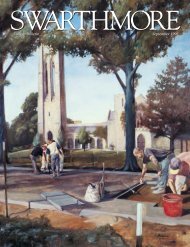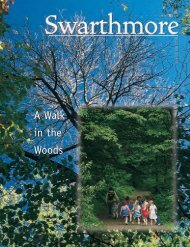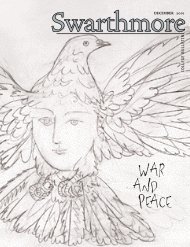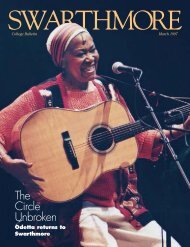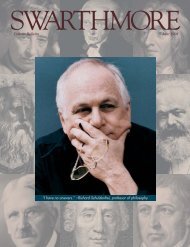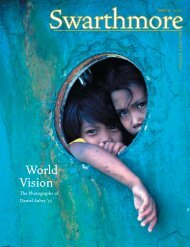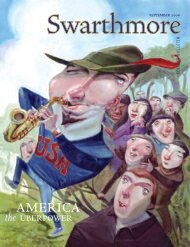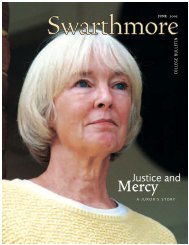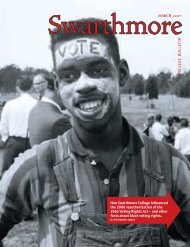Vietnam
Swarthmore College Bulletin (June 2006) - ITS
Swarthmore College Bulletin (June 2006) - ITS
- No tags were found...
Create successful ePaper yourself
Turn your PDF publications into a flip-book with our unique Google optimized e-Paper software.
shows. I came to cherish my ability toinspire audience members as they, totalstrangers, came up to me with tears drippingdown their faces, to say, “Michael. Thankyou for sharing your story.”College: Freshman year. One of my professorsat a well-known college in New Englandexpected the 25 students of my yearlong,interdisciplinary seminar program to explorethe themes of power, privilege, and inequalityand the problem of choice in a pluralisticsociety. Although insecure at the program’sstart because of the poor preparation Ireceived from my Chicago public school education,by the end of the year, I had readmore than 40 books and crafted more than30 essays. I reflected on how, in sociology, Ilearned about the institutionalized racismthat perpetuates the imprisonment of blackmen. I related to the struggle that each ofthe narrators in my favorite novels, The GreatGatsby and Invisible Man, faced as theyattempted to shape their identities in culturesthat marginalized them. I was proud ofthe paper I wrote on the striking parallel Isaw between the Spanish conquest of Mexicoand the current upper-class conquest ofinner-city neighborhoods such as AlbanyPark through gentrification—and how thisparallel reflects the never-ending cycle ofinjustice in our society. In just two semesters,I gained new knowledge and new tools,and I broadened my perspective on theworld.Yet despite the confidence, love for learning,and scholarship I was building in theclassroom, as soon as I left the classroom, Ifound myself walking with my eyes directedstraight at the ground because I was remindedabout my otherness on the campus. Hateincidents throughout the year—like the notewritten on a student’s dry-erase board thatread, “You are a dyke”; the swastika symboldrawn throughout a dorm hallway; and thestudent who yelled out a racist remark to acampus security officer of color—left mefeeling alienated, displaced, and unsafe.Even though none of these incidents was adirect attack on me, each represented profoundignorance and deep divisions amongpeople on campus.Not only did hate envelop the campus,but so did indifference and selfishness.Black Solidarity Day, held every year on Nov.1, is dedicated to recognizing black Americans’contributions to our nation. For3 weeks, UMOJA, the small but activeAfrican/African-American Students Association,encouraged the campus community toshow support by dressing in special clothing.Proudly walking out of my dorm room,wearing all black and a green and red ribbon,I was bewildered to find that 3 weeks ofposters, e-mails, flyers, and voice-mailannouncements hadn’t been enough torouse students to support a day devoted tocelebrating the beauty of black culture andrecognizing its people’s historic struggle forequity and freedom.On weekends, while I read Freud, Plato,Kasulis, or the Gnostic gospels in the library;practiced Martha Graham dance techniquein the studio; or elaborated on a piano solo Icomposed in the music library, most of thestudents chugged so much beer and vodkathat they would leave cans and bottles andpuddles of stinking alcohol and vomit onthe floor for the anonymous custodians—who actually have names, like Marcia—toclean up the next morning. The mean-spiritedness,lack of engagement, and vapid selfinterestI found at this college are emblematicof an epidemic that plagues this mostlyprivileged yet ungrateful and ignorant studentbody.During winter break, I flew back toChicago to work with APTP on a festivalcalled Heat Included. The Albany Park communitygathered to witness powerful performancesabout struggle and resilience, sitin on panel discussions about undocumentedimmigrant rights and the poor state ofcollege counseling programs in Chicagopublic high schools, sip rich hot cocoa andsavory soup, and listen to good live music.In a dance-theater piece called Nine Digits, Iplayed a young man named Julio who wasillegally brought to the United States fromColombia by his parents when he was asmall child to escape poverty and war. As hegot older, he experienced the debilitatingconstraints of not being a citizen in thecountry that is truly his home. As I workedon this politically charged piece, I also listenedto my opinionated and passionate fellowcompany members voice their angertoward President Bush for fusing the separateinstitutions of church and state andspending more money on the Iraq War thanit would cost to end world hunger. I wasthankful for the invaluable lessons thatAPTP taught me and for the loving sense offamily it never fails to provide. I was remindedabout the level of social and politicalengagement and the open-mindedness Isought in a college. Realizing that my currentsituation was preventing me frombecoming who I want to be, I searched for adifferent school where I could grow not onlyas a scholar but also as an activist and artistwho is a gay, first-generation, inner-city<strong>Vietnam</strong>ese American.Sophomore year. At Swarthmore, I had a secondchance. My modern dance instructor,Sharon Friedler [Stephen Lang Professor ofPerforming Arts] expects students to go upto the stage and work out movement phrasesevery day. I make mistakes almost every timeI go up there, but I grow as I take risks andas I get supportive attention. My voice is setat 10 because I have ideas to share—andthe caring, curious, and excited people atSwarthmore listen. When I leave the dancestudio, I walk down a beautiful campus pathwith my boyfriend and think, “I can’t wait tomeet with Allison Dorsey [associate professorof history, see p. 80] to talk about herbook To Build Our Lives Together.” Later inthe day, after admiring the drum battle onParrish Beach that stirs a sense of solidarityin everybody passing by, I head to the LangPerforming Arts Center to rehearse an originaldance piece inspired by my recent summerresearch on the role of women in <strong>Vietnam</strong>.I meet up with friends at Tarble, where,long after classes have ended, we immerseourselves in thoughtful conversations aboutsex tourism in Hawaii, how well the SagerSymposium planning is going, and whatwe’re wearing for the Screw Your Roommateparty. Too inspired to sleep, I stay up until3 a.m., writing an article to submit to OUR-Story about how my experiences at Swarthmore,especially within the vibrant Asiancommunity, are beginning to help bridge thegap between my <strong>Vietnam</strong>ese and Americanidentity. I’ll book my flight to Chicago forwinter break to visit APTP, looking forwardto sharing with the company my decision todouble major in sociology/anthropology anddance. As I greet my mom and sister in <strong>Vietnam</strong>eseat the airport, I’ll tell them about allthat I’ve learned, and my sister will say, “Ican’t wait to go to college.” TThis essay appeared in the fall 2005 issue of thestudent literary publication OURStory and isreprinted with the author’s permission. Write toMichael Nguyen at mnguyen1@swarthmore.edu.june 2006 : 33



